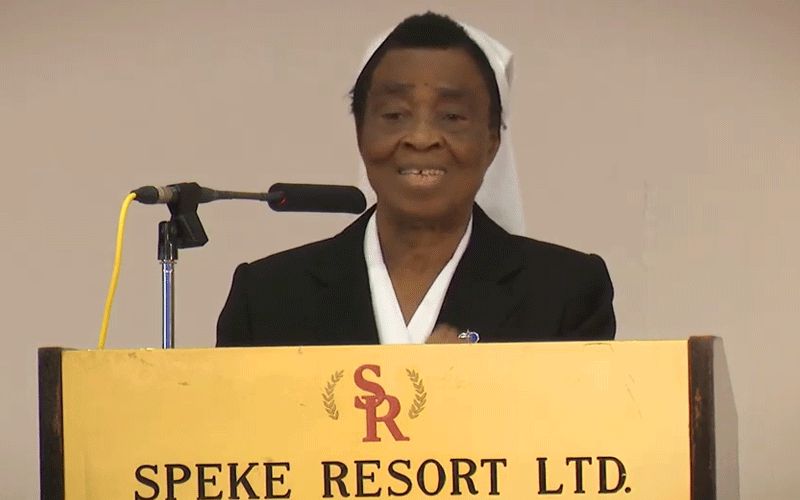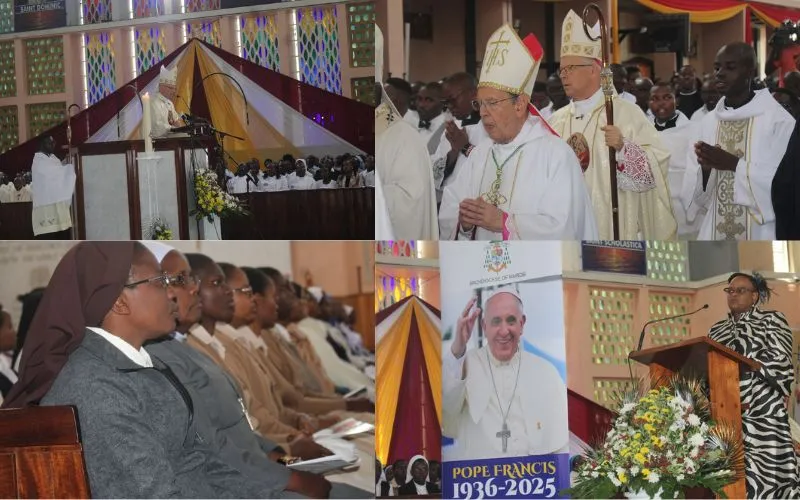Sr. Teresa who is the founding president of the Catholic Biblical Association of Nigeria (CABAN) notes that the pandemic is helping families to stay together in their Sunday worship and in all their prayers.
“Parents will have time for their children and assume the God-given responsibility to accompany them during the worship and explain to them the different parts of the Mass. We hope so,” she writes in her five-page reflection and adds, “We recall that the Jewish religion of all the ancient religions was first and foremost a way of life and a religion of the family starting with the Passover meal which foreshadowed our Lord’s Supper. Today we call it Mass.”
Referencing the Jewish Passover, Sr. Teresa recalls that each family at the time was to celebrate it, “and if a family was too small to finish the sacrificial lamb they were to join with another family.”
She adds in reference to the New Testament testimonies, “The early Christians celebrated the Lord’s Supper in private homes, what biblical scholars call ‘house churches’. A number of the key house churches were owned by women,” she recalls in her reflection and highlights the example of Mary, the mother of John.
The Nigerian nun appeals to Christians to stop protesting over the “locked church buildings” but instead “ask pardon for ourselves and for others, especially Christians, who have shut their ears to what Jesus tells us about our God-given identity and worth.”
(Story continues below)
There is a need for Christians around the world, according to Sr. Teresa, to realize that “we are the church and that no human being can close or lock up that church, except ourselves.”
“We can attend Mass daily and even every Sunday, receive Holy Communion, and yet not be or see ourselves as the church of God,” she reflects.
She goes on to quote St Paul telling the Corinthians (1 Cor 11:1-34) that when they meet to eat their food according to their rank, tribe and so forth and do not discern, understand that all the people gathered constitute the body of Christ, they are eating their own supper not the Lord’s Supper and consequently, they are eating and drinking judgement to themselves.
Referencing the letter to the Corinthians, she says, “Today we interpret this passage as referring to unworthy reception of Holy Communion. This was not Paul’s way of understanding the body of Christ. For him Christ’s body are believers that Christ has united in himself as integral members of his body.”
In praying in the silence of their homes with their loved ones, Sr. Teresa says that the Church has triumphed over COVID-19 disease.
“COVID-19, where is your victory? Where is your sting? Where is your ability to destroy our true worship of God? Thanks be to God who has used you to remind us of who we truly are in God and of what it means for us to be church. We are God’s own gathering and reconciling of humanity and creation to the divine self in and through Christ,” she reflects.
Sr. Teresa’s reflection captioned, “Being the Church in the face of COVID-19” is a call on Christians “to assume the responsibility to be church, a living member of the body of Christ.”
“Above all, I hope this reflection will help you to assume the responsibility to be Church, a living member of the body of Christ; to assume personal responsibility to be this church not only on Sundays but as a total way of life in Christ. Against such worshippers, there can be no locked churches. It is a matter of faith,” her March 30 reflection reads.
“We need further to remember Jesus' promises to be with us when pray "When two or three are gathered in my name I am among them" (Matt 18:20). If only we would take Jesus at his word! The entire chapter, Matthew 18, is about being church and relating as church,” Sr. Teresa told ACI Africa in a separate message Monday, March 30.
Agnes Aineah is a Kenyan journalist with a background in digital and newspaper reporting. She holds a Master of Arts in Digital Journalism from the Aga Khan University, Graduate School of Media and Communications and a Bachelor's Degree in Linguistics, Media and Communications from Kenya's Moi University. Agnes currently serves as a journalist for ACI Africa.








